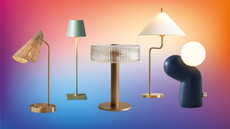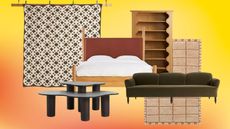Designer Profile: Piero Lissoni
HOW DID YOU START OUT?
After graduating in architecture in 1985, I worked for the kitchen and bathroom manufacturer Boffi before setting up my own studio. I approach everything from a human angle – I try to be an architect, engineer, sculptor, painter, film maker, photographer, writer, even poet, all at the same time.

HOW WOULD YOU DESCRIBE YOUR STYLE?
I’m known for my pure, elegant aesthetic and use of quality materials and refined execution. For many architects, buildings are just the outside face and they don’t bother about the inside. For me, if you disconnect the building and its interior, you cut it off from its soul. I think it’s more interesting to be involved in the whole process – you can get the client more involved and pursue your ideas in their entirity.

WHAT DO YOU MEAN BY PURITY?
I don’t like too many frills. I like to work with white, it has so many different colours within it – it’s like a pentagram with great power. White provides the most sensual backdrop for the reflection for light.
WHAT'S THE BEST WAY TO CREATE A HOME?
Keep it simple. I designed my home to be more or less without much furniture, maybe a simple rug and nothing else around. I don’t want to live in a house full of designed pieces – who wants to live in a catalogue? It’s better to live in a pure space, with a combination of antique pieces, vintage Italian and Scandinavian and sometimes American furniture pieces, books and objects collected from your travels.

WHAT ARE SOME OF YOUR FAVOURITE PIECES?
I admire the classics – Charles and Ray Eames, Le Corbusier, George Nelson, Achille Castiglioni (I like the Arco lamp for Flos), Shiro Kuramata. I have a number of original 1920s pieces by Mies van der Rohe. If I was going to live in old houses, I’d have a Jasper Morrison piece in each one.

TELL US ABOUT YOUR OWN TUSCAN RETREAT
I avoided a pastiche of a country hideaway by going for something that’s more like an urban townhouse that happens to be in the countryside. I’ve gone for beautiful materials and surfaces, combining wooden floors with a bit of rough concrete, and concrete mixed with local earth to create a characteristic pinkish hue. Large windows connect the inside and out to create a super huge screen for watching nature like my own movie theatre.
WHAT'S THE BEST WAY TO DEVELOP DESIGN IDEAS?
I start with a prototype that I constantly change – sometimes up to 20 times. I look at the way people live and build designs around the rituals of daily life. Landscape is important and I try to ground an idea in its space, using local artists when possible.

HOW DOES DESIGNING A HOME DIFFER FROM A RESTAURANT OR A HOTEL?
At home, the kitchen is about being social, its where our families gather together around food and each other; in a restaurant, creating an ambience is not more important that creating a space to enjoy good food – it has to feel a little bit familiar, warm but simple, and absolutely no elevator music anywhere. I like to hear the sound of people’s voices. For a hotel like the Conservatorium in Amsterdam, mixing old and new, I loved connecting the original 19thCentury building with a new courtyard completely covered by glass.

YOU LIKE TO PLAY WITH INTERESTING MATERIALS?
I try to use natural, chic and shabby materials together, for example cutting-edge stainless steel with very tactile, rustic old wood. It’s about the contrast – play with different materials in a sustainable way, don’t use wood that requires destroying forests or stone that decimates mountains. Sustainability relies on durability. A good-quality piece of furniture shouldn’t need replacing every year.

WHAT'S THE MOST SATISFYING THING ABOUT WORKING WITH DIFFERENT DESIGN BRANDS?
It’s impossible to design for a brand without understanding what makes them special. For a company like Lema, who I’ve been been working with as Artistic Director for 20 years, I don’t just design product but their shops and catalogues too, building a DNA for the brand.
YOU HAVE A THING ABOUT STAIRCASES...
On one level, staircases are a means of moving from one space to another, but for me, they also become a time zone between two universes – when we walk up or down a set of stairs, we momentarily enter a special twilight zone where we can dream a little.

WHAT'S YOUR FAVOURITE PIECE YOU'VE DESIGNED?
With Kartell we found a way to use carbon fibre in a different way, pioneered in the world of cars and planes but never used in furniture – it took two years and a ton of mistakes, but in the end it was our respect for the technology that helped define the end design of the chair. Its only 2mm thick and weighs only 2kg, and it has a great ass!

TELL US ABOUT SOME OF YOUR MOST RECENT PROJECTS
My Shabbychic porcelain collection for SchönhuberFranchi launched at Maison & Objet in January – it has a flea market feel, designed with 15 different blue and white patterns for mixing and matching. It’s fairly easy to make something perfect nowadays, so I like designing things with a slight imperfection, some kind of flaw.

WHAT KEEPS YOU INSPIRED?
Life. Paintings, movies, photography, food, newspapers, friends, food, family, books, music, even pretty girls on the street. I like to wake up and think each day is a new day. That’s what makes me smile.
Be The First To Know
The Livingetc newsletter is your shortcut to the now and the next in home design. Subscribe today to receive a stunning free 200-page book of the best homes from around the world.
The homes media brand for early adopters, Livingetc shines a spotlight on the now and the next in design, obsessively covering interior trends, color advice, stylish homeware and modern homes. Celebrating the intersection between fashion and interiors. it's the brand that makes and breaks trends and it draws on its network on leading international luminaries to bring you the very best insight and ideas.
-
 The 12 Best Table Lamps for Reading —I'm a Certified Bookworm (and Shopping Expert)
The 12 Best Table Lamps for Reading —I'm a Certified Bookworm (and Shopping Expert)When it comes to table lamps for reading, I don't mess around. If you're the same, this edit is for YOU (and your books, or course — and good recommendations?)
By Brigid Kennedy Published
-
 "It's Scandi Meets Californian-Cool" — The New Anthro Collab With Katie Hodges Hits Just the Right Style Note
"It's Scandi Meets Californian-Cool" — The New Anthro Collab With Katie Hodges Hits Just the Right Style NoteThe LA-based interior designer merges coastal cool with Scandinavian simplicity for a delightfully lived-in collection of elevated home furnishings
By Julia Demer Published

